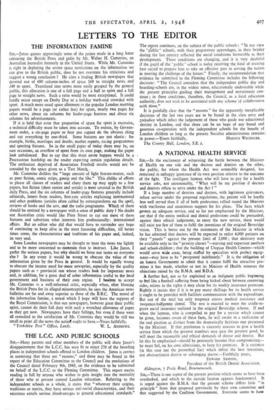A NATIONAL HEALTH SERVICE
SIR,—In the excitement of witnessing the battle between the Minister, of Health on one side and the doctors and dentists on the other, the public, for whom the Health Act was ostensibly designed, has remained in unhappy ignorance of its own position relative to the outcome of the fight. The intelligent layman who will have to pay for a health service asks, not unreasonably, " What will be my position if doctors and dentists refuse to serve under the Act ? "
If a large number of dentists and doctors, with legitimate grievances, refuse service under the proposed regulations, the patient will be hardly less well- served than if all of both professions rallied round the Minister with vociferous and unanimous support for his plans. The facts which govern an adequate service, and so far not emphasised by the Minister, are that if the entire medical and dental professions could be persuaded, against their ethical judgement, to enter the new service, there would still exist too few of them to fulfil the intentions of the original Beveridge vision. This is borne out by the statements of the Minister in which he has admitted that doctors will be expected to enlist 4,000 patients on their " panels " against the present limit of 2,000 ; that dentistry may be available only to the" priority classes "—nursing and expectant mothers and school-children ; that the building of Utopian Health Centres—which' would serve wide areas, being staffed by specialists with perfect equip- ment—may have to be "postponed indefinitely." It is the obligation ofl an honest Government to admit that it cannot fulfil the attractive pro- mises it has made, whether or not .its Minister of Health removes the objections raised by the B.M.A. and B.D.A.
A further fact, not so far explained to an indignant public beginning to feel like a football suffering from being kicked about between contesting sides, relates to the rights it may claim for its weekly insurance premium. Rightly it insists that if it is to pay many shillings for its health service it ought to be provided with facilities commensurate with the expenditure. But out of the total 'tax only tenpence covers medical assistance and twopence-halfpenny dental. The rest is exacted to meet the cradle-to- grave social insurance outlined in the original Beveridge scheme. If and when the layman, who is compelled to pay for a set vice which cannot be given, becomes aware of these facts, he will awake to a realisation of the real position as distinct from the dramatically fictitious one presented by the Minister. If that gentleman is sincerely anxious to give a health service from which the greatest numbers may gain the greatest good, he will meet the reasonable and ethical demands of doctor and dentist. But let this be emphasised—should he penitently become thus compromising— he must fail, on his own admissions, to keep his promises. It is statistics (in this case not the proverbial liar) which defeat the best intentions, not obstructionist dentist or sabotaging doctor.—Faithfully yours,
EDWARD SAMSON,
President of the British Dental Association. Aldington, 7 Poole Road, Bournemouth.






























 Previous page
Previous page